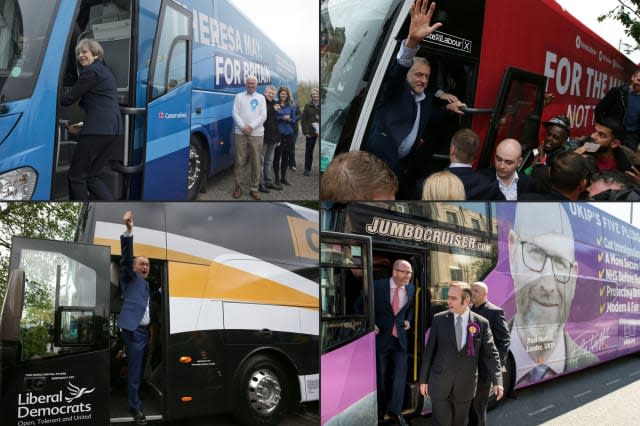What the election could mean for your money

This general election has been about all sorts of things - from memory tests to personality cults - but unless you want to risk a nasty surprise when you wake up on Friday morning, it should also be about the money in your pocket too.
See also: Millions of couples 'would face higher income tax under Corbyn'
See also: 'Wait and see' approach over General Election leads to housing market pause
It's therefore worth getting to grips with what each of the major parties has in store for your pocket.
Conservatives
One of the key issues for the Conservatives is what was missing from the manifesto - they haven't renewed their pledge to leave National Insurance untouched, which could signal plans to tinker with the rate or thresholds.
Tax pledges they have stuck with include increasing the personal tax allowance to £12,500 by 2020 and raising the threshold on the higher rate of tax to £50,000 by 2020. They have also pledged to raise the inheritance tax threshold for couples leaving their home to children to £1 million.
They have pledged VAT would not rise, and a clampdown on tax avoidance (promises that are also shared by Labour and the Liberal Democrats).
It's worth noting that UKIP is mirroring the IHT pledge, and going further, pledging to raise the personal allowance to £13,500 and higher rate threshold to £55,000.
On pensions, the state pension triple lock would be downgraded to a double lock in 2020 - so would be linked to the highest of price inflation or wage inflation.
Pensioner benefits would be preserved, but the winter fuel allowance would be means tested. The party has also said there are no further plans for radical welfare cuts - but there's no detail on its definition of a 'radical cut'.
On social care, nobody with any less than £100,000 in assets will have to pay for care (up from £23,250), but at-home care will be means-tested in the same way as residential care, so more people will have to pay. It's unclear whether family homes will count towards the cap.
Tuition fees will rise with inflation until 2020.
Energy bills will be capped on the standard variable tariffs.
And the Conservatives have stuck with their pledge to build a million homes by the end of 2020.
Labour
Jeremy Corbyn, meanwhile, wants to focus tax revenue on the top 5% of earners – those making £80,000 or over. The plan is to reduce the threshold for additional rate tax (45%) from £150,000 to £80,000 and reintroduce the 50p tax rate for anyone earning £123,000 or over.
They also want to reverse the capital gains tax and inheritance tax breaks brought in by the Conservative government (an ambition that's shared by the Liberal Democrats). And they want to abolish the married couples allowance (as do the Lib Dems).
And they want to reform council tax with a tax based on the value of the land a home is built on.
Aside from tax changes, Labour wants to change the law so banks cannot close a branch where there is a clear local need, and establish a National Investment Bank.
It has pledged to keep the state pension triple lock, and put rises in state pension age beyond 66 on hold. There would also be help for women facing hardship because of rises in the state pension age that have already taken place.
Universal Credit would be redesigned, Employment and Support Allowance increased, and Carer's Allowance increase. Housing benefit would be reinstated for the under 21s, as would the Bereavement Support Payment. The benefits freeze would be ended too (something the Liberal Democrats have also pledged).
Tuition fees would be abolished from 2018, and students mid-way through their degrees will not pay in future years.
Energy bills will be capped while we move to a 'fairer system' for bills. There are also plans to renationalise the energy supply and the water supply - and offer more assistance for energy efficiency and warm homes.
There will be a million new homes, and 100,000 more social homes each year. The right to buy policy would come to an end (something the Liberal Democrats have also pledged).
The Liberal Democrats
The big tax headline for the Lib Dems is their plan to increase income tax by 1p in the pound across the board – in order to raise £6 billion for the NHS and social care. A care cap will also limit the amount anyone will have to pay for care during their lifetime.
The Liberal Democrats have also pledged increase the threshold for National Insurance, to bring it in line with income tax - so more of lower incomes are free of tax.
Meanwhile, they also want to see council tax increased on second homes, and would review taxation, to ensure it is spread evenly between the generations.
Aside from tax changes, they have committed themselves to the state pension triple lock, and will review pension tax relief, with a view to bringing in a single rate of relief - to spread it more evenly among different levels of earners.
They would reinstate maintenance grants for the poorest students - although they would keep tuition fees.
There would be more help for home insulation and community energy firms. There would also be more investment in renewable technologies.
They would build 300,000 homes a year by 2022.
The Liberal Democrats would also lower the threshold for Universal Credit and reverse cuts to Universal Credit work allowances, housing benefit for the under 22s would be reintroduced and winter fuel payments would be withheld from higher rate taxpayers.



